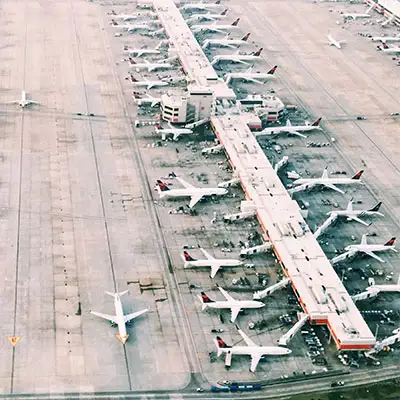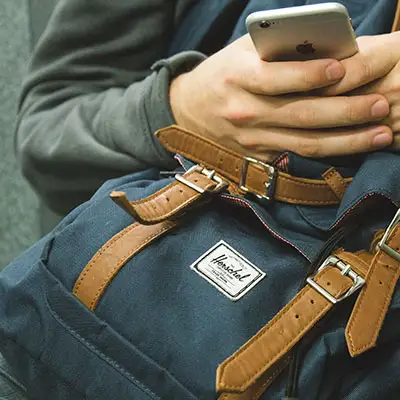Flight cancellations are never fun. They impact your trip, no matter what, and rarely in a way that benefits you. In light of recent mass cancellations — can you say “flightmare”? — it’s important to know what to do when a flight is cancelled or delayed.
How to Avoid Flight Cancellations and Delays
The best offense is a good defense. Rather than waiting to scramble when your flight is delayed or cancelled, take precautions that can help you avoid these disruptions in the first place. None of them is failproof, but they can improve your odds of getting to your destination on time.
1. Research airlines’ track records.
Find out which airlines have the most cancellations and delays as well as which ones have the best policies if they do cancel or delay your flight. Airline X might be a bit more expensive, but if it has a better reputation for getting you in the air on time, it could be worth paying more.
2. Pick alternate airports.
Which airport you fly from can impact your ability to avoid flight cancellations and delays as much as when you fly (in the mornings and during the week are generally better). Consider flying from a smaller regional airport. Because they have fewer crowds, you may be less likely to get caught in a herd of stranded passengers all trying to rebook at the same time. The flipside, however, is that if there is a cancellation, there are fewer alternative flights to rebook on.
Another option is to fly from a larger international airport, even if it means you have to drive a bit farther to get there. Yes, there are more crowds, but larger airports often offer more direct flights, and that means less risk of your trip being disrupted part way through.
3. Book directly through the airline.
Third-party aggregators like Expedia can help you compare prices and find the best deals on flights. Once you’ve found a flight you like, purchase directly from the airline instead. This will simplify things if your flight is delayed or cancelled and you want to seek compensation or a refund. If you purchase through a third-party company, you might end up having to contend with their cancellation policy as well as the airline’s, and that just makes things more complicated.
4. Give yourself the best odds.
Two of the easiest ways to reduce the chance of your trip being impacted by a flight delay is to give yourself extra time for connections and to be a smart packer. Think about it: if your first flight is delayed even just 30 minutes and you’ve only given yourself an hour to make your connection, you’ll be cutting it very close to make your next flight. A two-hour window to make a connection might seem excessive. However, if it helps you avoid missing subsequent flights, you’ll be glad for the forethought.
There are two parts to being a smart packer when you’re trying to avoid getting burned by flight delays. First is to check as few bags as possible. It’s even better if you don’t check any. This cuts down on the risk of not getting your bags on arrival, particularly if you had a connecting flight.
The second tip is to know what can go in your carry-on bag. Once you’ve decided to not check any luggage, make sure you aren’t inadvertently bringing too many liquids or a banned item through security. Even nail clippers have been known to get you stopped and searched. And when you get searched, you’re not getting to your gate quickly.
5. Buy travel insurance.
It’s true that airlines are offering more incentives and friendlier cancellation policies. However, you’ll want to read their policies carefully to know what they do and do not provide compensation for.
It’s also important to note that although airlines might offer a refund for a cancelled flight, they won’t reimburse you for an unused hotel or tour reservation at your destination. That’s where travel insurance comes in. Even if you choose not to purchase protection for your flight, travel insurance can cover other prepaid, nonrefundable trip expenses if you cancel your trip for a covered reason.
You can also add optional Cancel for Any Reason (CFAR) coverage to your trip protection plan. This allows you to cancel your trip for any reason you choose, not just those listed in your travel insurance plan and regardless of what might be included in the airline’s cancellation policy.
6. Check your flight status before you leave home.
Some flight delays and cancellations are made well in advance. Sign up for your airline’s free text alerts or use an app like FlightAware to receive notifications about changes in your itinerary. You might be able to get ahead of the game and rebook on another flight before you even leave home.
If the flight disruption is weather-related, such as a snowstorm moving into your departure city, call the airline. They may rebook you on an earlier flight to get you off the ground before the storm hits. Just know that there may or may not be a fee to rebook, depending on the airline and whether you have loyalty status with them, as well as the weather situation.
A word of caution. It’s still usually a good idea to go to the airport even if it looks like your flight will be delayed. Things can change in a hurry, and you don’t want to be sitting in your living room when you realize the plane took off because there was a small break in the weather.
What to Do When Your Flight is Cancelled or Delayed
All the research and prep in the world can’t stop every flight disruption from happening. These tips answer the all-important question we’re all asking: What should I do when my flight is cancelled?
1. Reschedule your flight.
The general policy as of Summer 2022 was for airlines to offer a refund if they cancel your flight for a “controllable” reason and you choose not to rebook. If you do choose to reschedule on another flight, either because of a cancellation or a delay, the key is to act quickly. Get in line at the ticket counter or gate. Act quickly. Rebookings often go on a first-come, first-served basis.
Alternatively, you can use the self-service kiosk. Because other passengers might not know this is an option or because they’re looking to make a more complicated switch and need to speak with an employee, there may be less of a wait if you’re willing to handle the details yourself.
A third option is to call the airline. Because speed is of the essence, call them even if you’re waiting in line at the counter or kiosk. Dialing the international call center, as opposed to the domestic line that more people are trying to get through in the event of mass cancellations, might be even quicker.
Finally, use your wait time to figure out what you want to ask for, and be ready to explain it when it’s your turn. Is there another route you’re willing to take? Do you want to reschedule your flight but only if it’s available the same day? Would you be willing to fly on another airline? If you’re looking for compensation, do you need meal vouchers, hotel vouchers, or both? When you know what you want, you'll lose less time trying to make a decision that could cause you to miss out on seats while other passengers rebook around you.
2. Find alternate transportation.
Sometimes a different flight isn’t an option, like when your plane was the last one of the day. Or maybe another flight isn’t your best option. Check into alternative modes of transportation like renting a car or catching a train to get to another airport or your destination. Again, speed is important here, much like when you’re trying to rebook a flight. Other passengers may be trying to do the same as you, and there are only so many rental cars to go around.
3. Ask for a refund.
The DOT has a list of flyers’ rights, which means you could be entitled to a refund if you’re bumped off a flight involuntarily or if your flight is cancelled and you choose not to rebook. Refunds for other reasons may be possible on a case-by-case basis, but this is rare. Make sure you know your airline’s cancellation policy; you may need to advocate for yourself.
When working with airline employees, please remember to be kind, even when standing up for yourself. They have been listening to other unhappy customers and are as stressed as you are. Plus, being polite is more likely to get you what you want. As they say, you catch more flies with honey than vinegar.
4. Keep your receipts.
You’ll want to keep all documentation of your trip expenses, particularly if your travel arrangements are pre-paid. If you start incurring additional expenses because of your flight cancellation or delay — rebooking fees, hotels for an overnight delay, and food, for example — keep those receipts as well. If the airline doesn’t provide reimbursement for those items and you need to make a travel insurance claim, having those receipts will help.
5. Be mindful of the rest of your trip.
When a flight is cancelled, it can disrupt your entire trip itinerary. Make sure you’re aware of your hotel’s cancellation policies. Also, if you are stuck somewhere overnight, ask your airline for a hotel voucher. If there’s mass cancellations for your airline, jump on a hotel reservation as soon as possible before they are sold out.
How to Make Flying Easier
Flights should be fun. They’re the start of a new adventure, after all! Find more tips for how to make flying easier on the Seven Corners blog. Need some help on how to fly with kids? What about using your frequent flyer miles to get a cheap flight?
Once you're ready to fly the friendly skies, make sure your trip is protected. Contact Seven Corners to find the best travel insurance for your next getaway.




